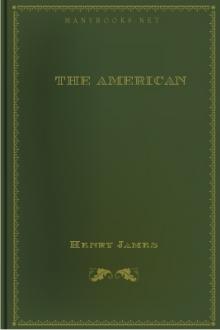Under the Red Robe by Stanley John Weyman (macos ebook reader TXT) 📗

- Author: Stanley John Weyman
Book online «Under the Red Robe by Stanley John Weyman (macos ebook reader TXT) 📗». Author Stanley John Weyman
They took the bait, winked at one another, and began to look at me in a more friendly way—the landlord foremost. But when I had led them so far, I dared go no farther, lest I should commit myself and be found out. I stopped, therefore, and, harking back to general subjects, chanced to compare my province with theirs. The landlord, now become almost talkative, was not slow to take up this challenge; and it presently led to my acquiring a curious piece of knowledge. He was boasting of his great snow mountains, the forests that propped them, the bears that roamed in them, the izards that loved the ice, and the boars that fed on the oak mast.
‘Well,’ I said, quite by chance, ‘we have not these things, it is true. But we have things in the north you have not. We have tens of thousands of good horses—not such ponies as you breed here. At the horse fair at Fecamp my sorrel would be lost in the crowd. Here in the south you will not meet his match in a long day’s journey.’
‘Do not make too sure of that,’ the man replied, his eyes bright with triumph and the dram. ‘What would you say if I showed you a better—in my own stable?’
I saw that his words sent a kind of thrill through his other hearers, and that such of them as understood for two or three of them talked their PATOIS only—looked at him angrily; and in a twinkling I began to comprehend. But I affected dullness, and laughed in scorn.
‘Seeing is believing,’ I said. ‘I doubt if you knows good horse when you see one, my friend.’
‘Oh, don’t I?’ he said, winking. ‘Indeed!’
‘I doubt it,’ I answered stubbornly.
‘Then come with me, and I will show you one,’ he retorted, discretion giving way to vain-glory. His wife and the others, I saw, looked at him dumbfounded; but, without paying any heed to them, he rose, took up a lanthorn, and, assuming an air of peculiar wisdom, opened the door. ‘Come with me,’ he continued. ‘I don’t know a good horse when I see one, don’t I? I know a better than yours, at any rate!’
I should not have been surprised if the other men had interfered; but I suppose he was a leader among them, they did not, and in a moment we were outside. Three paces through the darkness took us to the stable, an offset at the back of the inn. My man twirled the pin, and, leading the way in, raised his lanthorn. A horse whinnied softly, and turned its bright, mild eyes on us—a baldfaced chestnut, with white hairs in its tail and one white stocking.
‘There!’ my guide exclaimed, waving the lanthorn to and fro boastfully, that I might see its points. ‘What do you say to that? Is that an undersized pony?’
‘No,’ I answered, purposely stinting my praise. ‘It is pretty fair—for this country.’
‘Or any country,’ he answered wrathfully. ‘Or any country, I say—I don’t care where it is! And I have reason to know! Why, man, that horse is—But there, that is a good horse, if ever you saw one!’ And with that he ended—abruptly and lamely; lowered the lanthorn with a sudden gesture, and turned to the door. He was on the instant in such hurry to leave that he almost shouldered me out.
But I understood. I knew that he had neatly betrayed all—that he had been on the point of blurting out that that was M. de Cocheforet’s horse! M. Cocheforet’s COMPRENEZ BIEN! And while I turned away my face in the darkness that he might not see me smile, I was not surprised to find the man in a moment changed, and become, in the closing of the door, as sober and suspicious as before, ashamed of himself and enraged with me, and in a mood to cut my throat for a trifle.
It was not my cue to quarrel, however. I made therefore, as if I had seen nothing, and when we were back in the inn praised the horse grudgingly, and like a man but half convinced. The ugly looks and ugly weapons I saw round me were fine incentives to caution; and no Italian, I flatter myself, could have played his part more nicely than I did. But I was heartily glad when it was over, and I found myself, at last, left alone for the night in a little garret—a mere fowl-house—upstairs, formed by the roof and gable walls, and hung with strings of apples and chestnuts. It was a poor sleeping-place—rough, chilly, and unclean. I ascended to it by a ladder; my cloak and a little fern formed my only bed. But I was glad to accept it, for it enabled me to be alone and to think out the position unwatched.
Of course M. de Cocheforet was at the Chateau. He had left his horse here, and gone up on foot; probably that was his usual plan. He was therefore within my reach, in one sense—I could not have come at a better time—but in another he was as much beyond it as if I were still in Paris. For so far was I from being able to seize him that I dared not ask a question, or let fall a rash word, or even look about me freely. I saw I dared not. The slightest hint of my mission, the faintest breath of distrust, would lead to throat-cutting—and the throat would be mine; while the longer I lay in the village, the greater suspicion I should incur, and the closer would be the watch kept upon me.
In such a position some men might have given up the attempt in despair, and saved themselves across the border. But I have always valued myself on my fidelity, and I did not shrink. If not to-day, to-morrow; if not this time, next time. The dice do not always turn up aces. Bracing myself, therefore, to the occasion, I crept, as soon as the house was quiet, to the window, a small, square, open lattice, much cobwebbed, and partly stuffed with hay. I looked out. The village seemed to be asleep. The dark branches of trees hung a few feet away, and almost obscured a grey, cloudy sky, through which a wet moon sailed drearily. Looking downwards, I could at first see nothing; but as my eyes grew used to the darkness—I had only just put out my rushlight—I made out the stable door and the shadowy outlines of the lean-to roof.
I had hoped for this, for I could now keep watch, and learn at least whether Cocheforet left before morning. If he did not, I should know he





Comments (0)